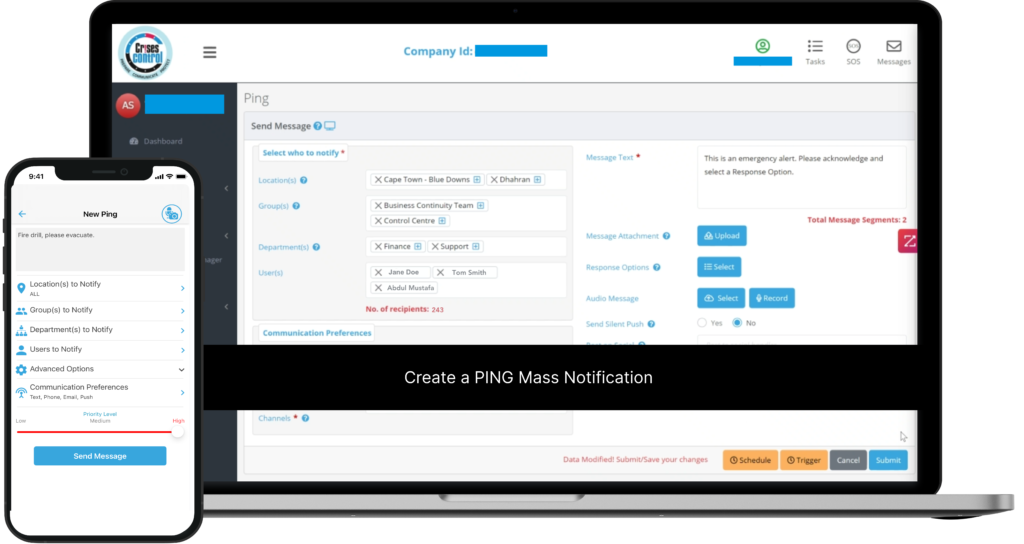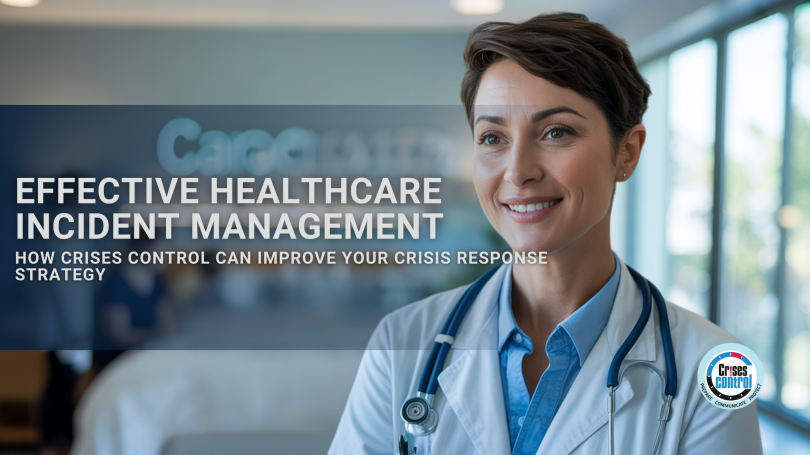Written by Anneri Fourie | Crises Control Executive
Healthcare crises can strike unexpectedly, from cyberattacks to natural disasters, pandemics, or even internal system failures. When an incident occurs, how well your team responds can determine the outcome. Unfortunately, many healthcare facilities still rely on outdated communication methods, like phone trees or pagers, that leave gaps in coordination and hinder effective response.
The reality is, in a crisis, time is your most valuable resource. Without the right systems in place, delays in communication, inefficient resource allocation, and confusion among teams can worsen the situation. A lack of coordination can jeopardise patient safety, compromise staff wellbeing, and tarnish your organisation’s reputation.
Effective Healthcare Incident Management is not just about having a plan, it’s about having the right tools and processes that allow your team to respond quickly, clearly, and efficiently. This is where Crises Control comes in, providing integrated crisis response software that ensures your organisation can act swiftly, and in unison, no matter the crisis at hand.
In this blog, we’ll explore the best practices for healthcare incident management, why traditional systems fail, and how Crises Control can improve your healthcare crisis response strategy.
What is Healthcare Incident Management?
At its core, Healthcare Incident Management is about having a structured and organised approach to handle crises that put your patients, staff, or facility at risk. These incidents can take many forms: natural disasters, medical errors, cyberattacks, pandemics, or even system failures.
Effective incident management ensures that the right people are informed at the right time, resources are allocated efficiently, and everyone knows exactly what actions to take. But creating a comprehensive strategy involves more than just having a plan, it requires real-time, integrated communication and decision-making tools that can scale depending on the severity of the situation.
This is where Crises Control steps in. With its integrated crisis response software, healthcare teams can coordinate efforts with ease and precision, ensuring that each department acts quickly, efficiently, and in alignment with established protocols.
Why Traditional Healthcare Communication Systems Fail in a Crisis
The traditional methods of communication that many hospitals and healthcare providers still rely on, such as pagers, phone trees, or even paper-based systems, simply cannot keep up with today’s fast-paced emergency environments. Here’s why:
1. Delayed Notifications
In an emergency, time is critical. Traditional systems often result in delays, whether it’s a phone tree that takes too long to contact everyone, or a paper-based system that isn’t updated in real time. These delays can put lives at risk.
2. Inefficient Resource Allocation
Without real-time updates, healthcare providers struggle to allocate the right resources at the right time. Hospitals may end up over- or under-allocating resources like staff or equipment, further complicating the response.
3. Lack of Coordination
In emergencies, multiple teams need to work together. However, if different departments have separate communication channels, confusion can quickly set in. A lack of unified communication creates chaos during critical moments.
4. No Accountability
With outdated systems, there is often no clear way to track who has received, read, or acted upon critical information. This lack of accountability can lead to important details being missed and tasks being overlooked.
How to Improve Healthcare Crisis Communication
Effective communication is the backbone of any successful crisis response. Here’s how you can improve it, ensuring your healthcare team is always in the loop during a crisis:
1. Centralise and Automate Alerts
Crises Control allows you to centralise all communication efforts, sending automated alerts to the right people at the right time. Whether through SMS, email, voice calls, or push notifications, Crises Control ensures that your team receives real-time updates, no matter where they are.
2. Implement Role-Based Communication
In an emergency, not everyone needs the same information. For example, the ICU team doesn’t need the same updates as the IT department. Crises Control allows you to customise messages for specific roles, ensuring that everyone gets the relevant information they need to act without confusion.
3. Provide Real-Time Tracking and Acknowledgment
Accountability is crucial. With Crises Control, you can track who has received, read, and acknowledged critical alerts. If someone hasn’t responded in a set amount of time, the system escalates the alert, ensuring that no one misses vital information. This helps to ensure that every action is followed up on swiftly.
4. Test Your Crisis Communication System Regularly
You don’t want to discover flaws in your system during an actual emergency. Crises Control allows you to run regular simulations and tests, so your team is always prepared to handle a real crisis. Testing your system in a controlled environment builds confidence and ensures a faster, more coordinated response when the time comes.
Interested in our Ping Mass Notification Platform?
Efficiently alert everyone in seconds at scale with our Mass Notification Platform – PING, get the message out fast and ensure rapid response and recovery.

The Role of Incident Response Planning in Healthcare Crises
Incident response planning is about preparing for the unexpected. In healthcare, this means developing clear, actionable procedures for any type of crisis. Whether it’s a natural disaster, a cyberattack, or a mass casualty event, your team needs to know exactly what to do when an emergency occurs.
Here’s why a well-developed plan is crucial:
1. Clear, Predefined Procedures
Having a clear set of procedures is essential to prevent confusion during a crisis. When everyone knows exactly what their role is, from notifying first responders to implementing patient evacuation protocols, it enables a swift, efficient response.
2. Training and Awareness
Even the best plans are useless if your team isn’t trained to use them. Regular training sessions and drills ensure your staff is ready for any situation. Crises Control’s simulation tools allow you to test and refine your plans regularly, so your team is always prepared.
3. Real-Time Decision-Making Support
When every second counts, your team needs the ability to make decisions quickly and with confidence. Crises Control provides real-time data and tracking, so your staff can make informed decisions in the heat of the moment. This improves response times, minimises errors, and helps guide actions with precision.
Benefits of Mass Notification Systems for Hospitals
In the event of a crisis, your ability to communicate quickly and clearly is vital. Mass notification systems like Crises Control offer a host of benefits for hospitals and healthcare organisations:
1. Rapid, Efficient Communication
A well-designed mass notification system allows you to reach hundreds or thousands of people in just seconds. Crises Control makes it easy to notify your entire staff, or specific departments, ensuring no one is left in the dark during a crisis.
2. Multi-Channel Alerts
People don’t always have access to the same communication channels. Crises Control uses multiple platforms—SMS, email, phone calls, and even push notifications—to make sure that alerts reach all of your team members, whether they are on-site or off-duty.
3. Minimise Human Error
In high-pressure situations, human error is more likely. By automating notifications and providing clear tracking, Crises Control helps eliminate mistakes, ensuring that crucial information gets to the right people at the right time.
How Crises Control Can Help
Crises Control is an integrated crisis response software designed to make incident management in healthcare more efficient and effective. By streamlining communication, automating alerts, and providing real-time tracking, Crises Control ensures that your team can respond quickly, effectively, and in coordination with one another.
Here’s how Crises Control can improve your healthcare crisis response:
- Centralised Communication: All departments and teams are connected in one platform, eliminating silos and ensuring clear, concise communication.
- Automated Alerts: Save time by automating notifications and alerts, allowing your team to focus on what matters most.
- Accountability Tracking: Keep track of who has received and acknowledged alerts to ensure every task is followed up on.
- Customisable Response Plans: Tailor your response plans for various types of crises, whether it’s a cyberattack, medical error, or natural disaster.
- Regular Simulations: Test your crisis communication systems regularly to ensure your team is always prepared for any situation.
Conclusion: Ready to Improve Your Healthcare Incident Management?
When a crisis strikes, every second counts. A fast, coordinated response can make the difference between a successful recovery and a catastrophic failure. With Crises Control, you can ensure that your healthcare organisation is always ready to handle emergencies swiftly and efficiently.
Don’t wait for a crisis to highlight the weaknesses in your response strategy. Contact us today to schedule a free demo and see how Crises Control can help you streamline your healthcare incident management.
Request a FREE Demo

